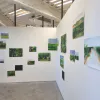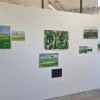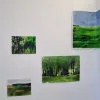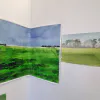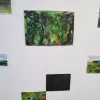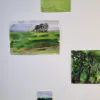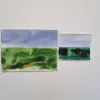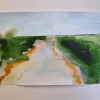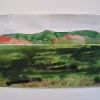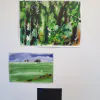Seminar Three Winter/July 2024
- 15 July 2024
Dalgety’s Corner
Bruno Latour and his philosophy of Care Ethics invite us to consider care for a non-human-centric world and to recognise our interconnectedness with nature.[1]
In 1910, my great-grandfather received land through a ballot, following the clearing and draining of the Hauraki Plains wetlands. For millions of years, a Kahikatea forest had flourished on these swamp lands, and later provided fish, birds, roots, flax, and building materials for local Māori. Early European explorers like Captain Cook and Joseph Banks believed that "swamps might doubtless easily be drained." The newly formed government considered the land "wasted" and believed it could be developed into productive flat farmland.
The ecologist Geoff Park wrote in 2006 that "The 85 percent decline in New Zealand's wetlands since European settlement is one of the most dramatic known anywhere in the world".[2]
“There were stumps on the farm but they were gradually got rid of. They were all carted off the paddocks and that was our firewood. There must have been some big trees on the place but at the time we went there it was covered in ti-tree but there were some big stumps in the ground.” [3]
– May Dalgety (nee Keith), my grandmother – she moved onto this farm at 4 years old.
Despite our awareness of the intricate connections between plants, animals, people and land, monetary concerns still heavily influence decision-making.
I have been thinking about the lens of care within my work. Do I show care by the investment of time and work that describes the land as it now looks, ensuring the story is told? These words by Anna Tsing add to my dwindling belief in our ability to improve the world and learn from our mistakes: “Neither tales of progress nor of ruin tell us how to think about collaborative survival.”[4] But we must care; we must start conversations; we must offer hope.
Jo Dalgety
All works are watercolour and graphite on paper.
[1] Michael Flower; Maurice Hamington. “Care Ethics, Bruno Latour, and the Anthropocene”, Philosophies 2022, 7(2), 31; https://doi.org/10.3390/philosophies7020031
[2] Geoff Park, Theatre Country : Essays on Landscape & Whenua (Victoria University Press, Wellington, 2006), 180
[3] Oral History Unit of the Historical Society of the Hauraki Plains, interview with May at her home in Ngātea, 28 July 1997.
[4] Anna Lowenhaupt Tsing. “A Look Inside the Mushroom at the End of the World” Princeton University Press. accessed June 4, 2024. https://press.princeton.edu/ideas/a-look-inside-the-mushroom-at-the-end-of-the-world.

